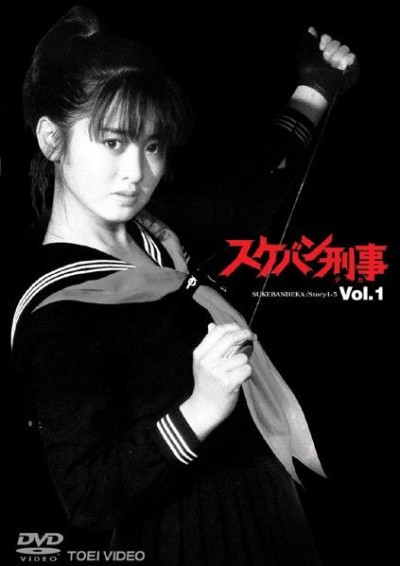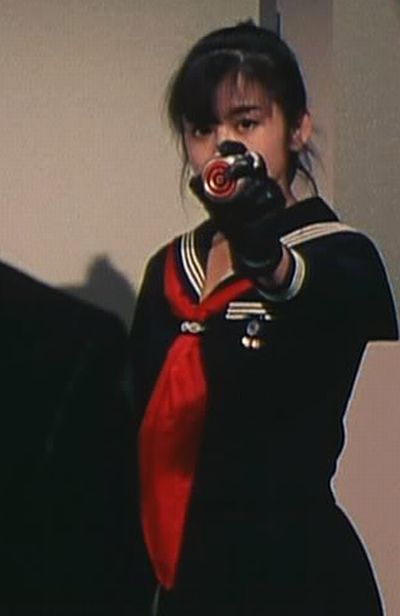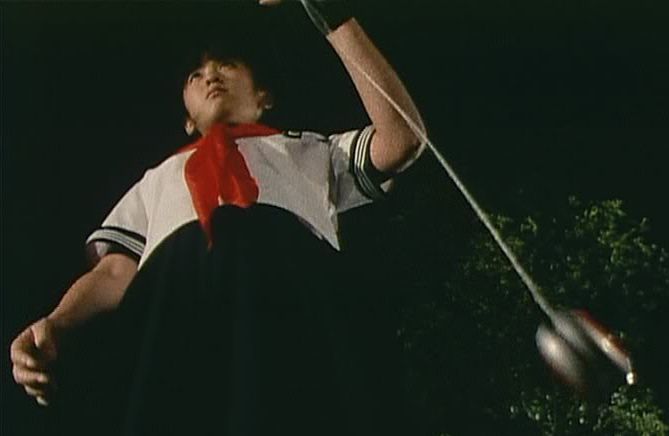★★★★
“String theory for beginners.”

 Probably the only TV series ever with a credit for “yo-yo coach” – Masaya Taki, should you be concerned about such things – I must confess to having thoroughly enjoyed this. It is, of course, a concept that’s entirely idiotic, but it’s executed with such serious intent that you can’t help but be swept along with the earnestness of the production. There are no sly winks to the cameras here: everyone, but in particular Saito as Asamiya Saki, is deadly straight-faced about their mission. And that’s absolutely the only way this kind of melodramatic soap-opera (“Who is Saki’s father?), crossed with high-school angst and not-exactly realistic martial arts should be played. A moment’s acknowledgement of Otherwise, it would collapse under its
Probably the only TV series ever with a credit for “yo-yo coach” – Masaya Taki, should you be concerned about such things – I must confess to having thoroughly enjoyed this. It is, of course, a concept that’s entirely idiotic, but it’s executed with such serious intent that you can’t help but be swept along with the earnestness of the production. There are no sly winks to the cameras here: everyone, but in particular Saito as Asamiya Saki, is deadly straight-faced about their mission. And that’s absolutely the only way this kind of melodramatic soap-opera (“Who is Saki’s father?), crossed with high-school angst and not-exactly realistic martial arts should be played. A moment’s acknowledgement of Otherwise, it would collapse under its
To start by filling you in on the background that took place before the show starts, Saki’s mother was sent to death row, after being framed for murder. To save her from being executed, Saki agrees to become “Sukeban Deka”, which roughly translates as “Delinquent Girl Detective”. Under the supervision of Jin (Naka), she goes into various educational establishments over the course of the 24 episodes that follow, uncovering malfeasance by those in charge and, not infrequently, the pupils too. But what distinguishes this from 21 Jump Street, say, is Saki’s weapon of choice: a yo-yo that pops open to reveal her official badge, but can also be used to knock people out, disarm them and even, courtesy of the string, as the equivalent of a pair of handcuffs.
For instance, the opening episode takes place at St. Anna High, where poor students are being bussed in to raise the school’s academic grade – but are then being forced to sit examinations on behalf of rich students, who are the ones that make the school profitable. Some subsequent stories demonstrate surprising social awareness for 1985, covering topics like bullying, competitive pressure and corporate bribery, but there are also more outrageous or exploitable elements, such as black magic, student-teacher relationships and high-school swimsuit models. Saki, however, doesn’t care, facing them all with the same expression of grim determination. Most of the episodes in the first half take place at Takanoha-Gakuen High, Saki’s old stomping ground, where the new queen bee is Miyako Yumekoji, who doesn’t take kindly to her predecessor’s return.
 In the second half, however, the structure changes. From about #11 on, instead of individual stories, there’s an increasing emphasis on a story arc involving a trio of girls, the Mizuchi sisters – daughters of a legendary Japanese industrialist. Initially, the girls seem intent merely on taking over Takanoha-Gakuen – though have no qualms about shooting Saki when she gets in their way. She initially manages to turn them back, but they then call big sis Remi (Takahashi), back from the United States, and she becomes the Big Bad for the rest of the first season. Saki has to survive a stint in reform school, and also deal with disturbing hints dropped by the patriarch of the family, that he had a close, personal relationship with her mother. [Remember the “Who is Saki’s father?” plot thread mentioned – that’s what we have here] Our heroine succeeds in taking him down, by broadcasting a conversation he doesn’t know is being recorded, and happiness beckons for Saki – unfortunately, Remi is having none of that.
In the second half, however, the structure changes. From about #11 on, instead of individual stories, there’s an increasing emphasis on a story arc involving a trio of girls, the Mizuchi sisters – daughters of a legendary Japanese industrialist. Initially, the girls seem intent merely on taking over Takanoha-Gakuen – though have no qualms about shooting Saki when she gets in their way. She initially manages to turn them back, but they then call big sis Remi (Takahashi), back from the United States, and she becomes the Big Bad for the rest of the first season. Saki has to survive a stint in reform school, and also deal with disturbing hints dropped by the patriarch of the family, that he had a close, personal relationship with her mother. [Remember the “Who is Saki’s father?” plot thread mentioned – that’s what we have here] Our heroine succeeds in taking him down, by broadcasting a conversation he doesn’t know is being recorded, and happiness beckons for Saki – unfortunately, Remi is having none of that.
Obviously, if you’re expecting anything like Go-Go Yubari from Kill Bill, you are going to be extremely disappointed. This is a television series, likely aimed at the contemporaries of Saki, and needs to be viewed as such. However, given that limitation, it’s remarkably engrossing, and does a very good job of telling a complete story inside little more than 20 minutes, as well as developing its characters. Sure, Saito will never be confused with Rina Takeda, but she gives it all she’s got, whether engaging in yo-yobatics, or spitting out her trademark introduction (something that, sadly, is also discarded during later episodes – even if it makes sense, given the longer story arc means she doesn’t need to introduce herself) with wonderful intensity.
The passage of this delinquent Asamiya Saki: what path of ruin do I follow? Now heading into the age of decadence. If I could laugh, I’d rather laugh. However, bastards like you, who don’t think anything of making students take exams illegally in the name of money… My soul ain’t sunk that low!
It takes a special level of deadpan talent to be able to unleash a slice of ripe Cheddar like that, and sell it with enough conviction that the reaction in this viewer – not exactly the intended teenage, Japanese, girl target audience, remember – is more “You go, girl!” rather than a derisive snort. It’s an interesting contrast to later entries, which had more of a team quality about them, with multiple yo-yo wielders. Here, Saki is a lone wolf, almost on her own: she has no parental guidance and Jin is interested only in practical help, furthering the success of her mission, rather than offering any personal support. The nearest thing she has a friend is schoolmate Sanpei Nowaki (Masuda), and he spends most of the show in a state of blithe ignorance about her real purpose. But I was particularly impressed by the final episode, which manages to kill off a surprising number of major characters, and leave even the fate of Saki and Remi uncertain. Subject to contract negotiation,. I imagine.
There are certain questions that remain opaque. It’s not quite clear how Saki becomes such a mistress of the flying cylinders either, or even why such a weapon was chosen. It doesn’t appear standard for the department, as another special agent shows up in one episode, and he’s entirely yo-yo deficient. Maybe such things are explained better in the 22-volume manga series by Shinji Wada on which this is based. It’s the kind of show where you need to have a willingness to accept such things for what they are, and if you go with the flow that results from the (admittedly, fairly barking-mad) idea, everything else will seem perfectly natural. While it’ll probably be a while before I get round to the second season, it’s something to which I am looking forward.
Dir: Hideo Tanaka
Star: Yuki Saito, Koji Naka, Yasuyuki Masuda, Hitomi Takahashi




